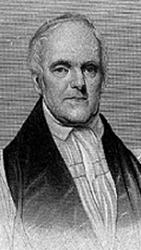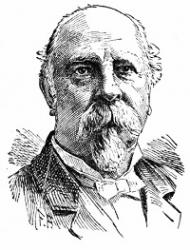Planning worship?
Check out our sister site, ZeteoSearch.org,
for 20+ additional resources related to your search.
- |
User Links
Person Results
Alexander V. Griswold

1766 - 1843 Person Name: A. V. Griswold, 1766-1843 Author of "Holy Father, Great Creator" in Hymnal and Liturgies of the Moravian Church Griswold, Alexander Viets, D.D., born at Simsbury, Connecticut, in 1766. After being for some time rector at Bristol, Rhode Island, he was consecrated bishop of the "Eastern Diocese," in 1811. He was subsequently Bishop of Massachusetts. He died in 1843, and his memoirs were published by Dr. J. S. Stone. His well-known hymn:—
Holy Father, great Creator. Holy Trinity. Was written probably in 1835. It appeared in that year in his Family Prayers, in 4 st. of 6 1. and entitled "Hymn to the God of Christians." With some alterations by Bishop Coxe, it was given in Hymns for Church and Home, &c, Phila., 1860, No. 153. It was repeated in the Hymnal .... of the Protestant Episcopal Church , 1871, No. 145.[Rev. F. M. Bird, M.A.]
-- John Julian, Dictionary of Hymnology (1907)
Alexander V. Griswold
Henry Godden Jackson

1838 - 1914 Person Name: Henry G. Jackson, 1838-1914 Author of "¡Oh Cristo! Erez Luz de Mi Vida" in Cántico Nuevo Born: January 1, 1838, Manchester, Indiana.
Died: November 12, 1914.
A Methodist minister, Jackson and his wife Alice spent many years as missionaries in Buenos Aires, Argentina. Upon their return to America, they lived in the River Forest/Oak Park area of Chicago, Illinois.
--www.hymntime.com/tch
Henry Godden Jackson
Claude de Santeul
1628 - 1684 Person Name: Claude de Santeuil, 1628-84 Author of "Now my soul, thy voice upraising" in The English Hymnal Santeüil, Claude de, elder brother of Jean-Baptiste de Santeüil, was born in Paris, Feb. 3, 1628. He became a secular ecclesiastic of the Seminary of St. Magloire, Paris, whence he was also known under the Latin-ized form of his name as Santolius Maglorianus. He died Sept. 29, 1684. Like his brother, he was a good writer of Latin poetry, and some hymns by him were included in the Cluniac Breviary, 1686, and the Paris Breviaries of 1680 and 1736. Some of these hymns have been translated into English, and are in common use in Great Britain. [George Arthur Crawford, M.A.]
--John Julian, Dictionary of Hymnology (1907)
Claude de Santeul
Mary Robertson Maxwell
Person Name: Miss Mary Maxwell Author of "Saints of God! the dawn is brightening" in The Hymnal, Revised and Enlarged, as adopted by the General Convention of the Protestant Episcopal Church in the United States of America in the year of our Lord 1892
Mary Robertson Maxwell
John E. Bowers
1923 - 2019 Person Name: John E. Bowers, b. 1923 Author of "Christians, lift your hearts and voices" in Common Praise
John E. Bowers
Samuel Webbe

1740 - 1816 Person Name: Samuel Webbe, 1740-1816 Composer of "ST. THOMAS" in Church Hymnal, Mennonite Samuel Webbe (the elder; b. London, England, 1740; d. London, 1816) Webbe's father died soon after Samuel was born without providing financial security for the family. Thus Webbe received little education and was apprenticed to a cabinetmaker at the age of eleven. However, he was determined to study and taught himself Latin, Greek, Hebrew, French, German, and Italian while working on his apprenticeship. He also worked as a music copyist and received musical training from Carl Barbant, organist at the Bavarian Embassy. Restricted at this time in England, Roman Catholic worship was freely permitted in the foreign embassies. Because Webbe was Roman Catholic, he became organist at the Portuguese Chapel and later at the Sardinian and Spanish chapels in their respective embassies. He wrote much music for Roman Catholic services and composed hymn tunes, motets, and madrigals. Webbe is considered an outstanding composer of glees and catches, as is evident in his nine published collections of these smaller choral works. He also published A Collection of Sacred Music (c. 1790), A Collection of Masses for Small Choirs (1792), and, with his son Samuel (the younger), Antiphons in Six Books of Anthems (1818).
Bert Polman
Samuel Webbe
Francis Scott Key

1779 - 1843 Author of "Lord, with glowing heart I'd praise Thee" in Church Book Frances Scott Key USA 1779-1843. Born in Frederick County, MD, and educated at St. John’s College, Annapolis, MD, a devout Episcopalian, he practiced law in Washington, DC for four decades. He was U.S. District Attorney for the District of Columbia until his death. He argued some of his cases at the Supreme Court. Key served briefly in a Georgetown militia unit. He married Mary Tayloe Lloyd in 1802, and they had eleven children: Elizabeth, Maria, Francis, John, Anna. Edward, Daniel, Philip, Ellen, Maria, and Charles. He also wrote a few hymn lyrics. During the War of 1812, which Key was against, the British invaded the U.S. and burned the White House, Capitol Building, and Library of Congress. One of Key’s friends, Dr. William Beanes, accused of helping in the arrest of British soldiers, was taken prisoner by the British. With the permission of President James Madison, Keys went to Baltimore to try to secure his release with a prisoner exchange. Sailing on a sloup flying a flag of truce for several miles at sea, they found the Tonnant, the ship Beanes was held on, and finally negotiated the release, After showing the British letters from grateful wounded British troups that had been treated by Dr. Beanes. They tried to leave the area, but were temporarily prevented, as the British were bombarding Fort McHenry. Major George Armistead, Commander of Ft. McHenry, had asked that a large flag be made so British vessels could see it over the fort from a great distance. The flag made of cotton bunting was 24 x30 feet in size. When hoisted, it looked huge. Detained, and watching from a ship about eight miles away, Key saw the British fail to destroy the Fort, or even the flag flying over it. The British could not move in cfloser with their ships, as close-range bombardment from Americans had already sunk 22 vessels. After firing 1500 bomb shells, each weighing as much as 220 lbs. from a distance of several miles out the British gave up trying. Key penned his famous lines about the incident, then finished the poem in a hotel room later. The poem was printed in newspapers, and soon a popular drinking tune, “Anacreon in Heaven”, by John Stafford Smith, was chosen to accompany it, and people began referring to the song as “the star-spangled banner”. Four stanzas were written, but usually only one verse, the first, is sung. Key’s brother-in-law, Joseph Nicholson, noted that Key’s words fit the song, so he took the poem to a printer in Baltimore and had it printed. Two known copies of the printing have survived. His famous song was sung in 1897 at baseball opening day ceremonies in Philadelphia. In 1899 the U.S. Navy adopted the song. In 1916, President Woodrow Wilson announced that it should be played at all official events. In 1918 it was sung during the 7th inning of the World Series . It was adopted as the National Anthem in March 1931. During WWII it was sung at every baseball game. Key was a slave owner for years, but an opponent of slave trafficking. He eventually became a leader of the American Colonization Society which sent freed slaves to Africa, and he freed his slaves, even giving free legal representation to some seeking their freedom. He also represented owners of run-away slaves. In 1841 Key became a member of President Andrew Jackson’s “kitchen cabinet” a group of informal close advisors that did not hold public office but met with the president from time to time. In 1823 Key helped found the Virginia Theological Seminary. He supported the Episcopal Church for decades, taking an active roll in Christ Church and St. John’s Church in Georgetown, and Trinity Church in Washington, DC. He served as a lay rector for many years, leading services and visiting the sick. Of his many poems, religious themes were frequent, and most of his works were printed, collected and published in New York as “Poems” in 1857. Key died in Baltimore, MD, of pleurisy. Honors include: two bridges names after him (in Arlington, VA & Baltimore, MD), St. John’s College auditorium, Inducted in Songwriter’s Hall of Fame, Key Hall at University of MD, a residence hall at George Washington U, a high school in rural MD, a middle school in Houston, TX, elementary schools in several states, a mall in MD, a Baltimore minor league baseball team, A San Francisco monument (torn down in 2020 by a radical group after a $140,000 renovation), a WWII Liberty ship, and a U.S. Navy submarine.
Special note: In 2001, after the 9/11 catastrophe in New York, Queen Elizabeth II allowed her guards at Buckingham Palace to play the song, and the next day, at St. Paul’s Cathedral, she joined in the singing of it at a memorial service.
John Perry
=================
Key, Francis Scott, was born in Frederick County, Maryland, 1779, and educated at St. John's College, Annapolis. He practised as a lawyer in Washington, District of Columbia, and was the United States District Attorney there till his death on Jan. 11, 1843. His poetical pieces, which were printed in various works, were collected and published in New York as Poems in 1857. His hymns in common use include:—
1. Before the lord we bow. National Thanksgiving. This Thanksgiving hymn for the 4th July was published in 1832, and was probably written for the celebration of that year. It is in use in Great Britain and America.
2. If life's pleasures charm [cheer] thee. The heart for God only. Appeared in The Christian Lyre, 1830.
3. Faith is the Christian's evidence. Faith.
4. Lord, with glowing heart I'll praise Thee. Praise for Pardon and Peace. Published in Dr. Mühlenberg's Church Poetry, 1823, the Prayer Book Collection, 1826, &c.; and altered as "Lord, with fervor I would praise Thee," in the Unitarian Hymns for the Church of Christ, Boston, 1853. In the Oberlin, Ohio, Manual of Praise, 1880, it begins with st. ii., "Praise, my soul, the God that sought thee."
Of these hymns Nos. 1, 2, and 4 are in the Lyra Sacra Americana, 1868, together with the following:—
5. Behold the grant the King of kings. All things in Christ.
6. My God, my Father, may I dare. God, the Father.
7. When troubles, wave on wave, assail'd. Efficacy of Prayer.
F. S. Key was also the author of "The Star Spangled Banner" (1814). For original text of his pieces see the Poems, 1857. [Rev. F. M. Bird, M.A.]
-- John Julian, Dictionary of Hymnology (1907)
Francis Scott Key
Charles William Schaeffer
1813 - 1896 Person Name: Charles W. Schaeffer Translator of "Father, Son, and Holy Spirit" in The Parish School Hymnal
Charles William Schaeffer
Emily Anne Eliza Shirreff
1814 - 1897 Person Name: E. L. Shirreff Author of "Gracious Saviour, who didst honour" in The Book of Common Praise
Emily Anne Eliza Shirreff
Joanne Reynolds
Author of "How Shall I Serve You, Lord?" in Hymns for a Pilgrim People
Joanne Reynolds


 My Starred Hymns
My Starred Hymns

